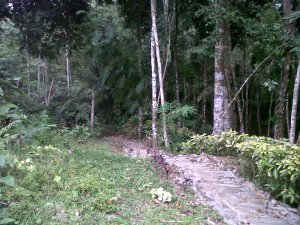June is Here
For science teachers in the Philippines, the coming of June marks another school year for challenges and issues in making science learning for students worthwhile. This is another chance to discover new ways of making students learn more. For some, it could be a chance to try out and improve their teaching strategies and approaches. For me, I am quite excited to try out some of the activities I been planning to implement in the classroom. I am excited to see how the students will respond to it and measure if there is improvement in learning and attitude toward science.
My university will be opening the new engineering complex this school year. I am sure that students will be happy to use the classrooms here. So teachers are challenged to provide the best learning experience as the learning environment has been made as conducive as possible. Happy teaching everyone and make a great impact in your students’ life. Make them happy to learn science.
Reading in a Chemistry Classroom
As a chemistry teacher, I tried an intervention involving the use of teacher-made reading materials in order to improve chemistry achievement, attitude towards chemistry and reading comprehension skills. I made use of a counterbalanced research design and conducted the experiment for two months. The first group was exposed to the use of supplemental texts for four weeks. Lessons were delivered through PowerPoint presentation for 30 minutes, followed by a reading activity for 15 minutes. The reading material is about a chemistry concept or topic and has questions that students will answer with a partner. After the reading activity, a discussion facilitated by the teacher follows. First, the teachers will randomly call students to read a paragraph aloud until we have finished reading the entire selection. Then, the teacher will call at random another student to answer a question in the reading material. The teacher will also ask that student to point out which paragraph in the selection contains the answer. The teacher points out the connection between the concepts in the reading material and the lesson. Before the experiment, pretest on reading comprehension skills, attitude toward chemistry and the first achievement test was given. There were a total of four achievement tests given as pretest and posttest covering the topics for two months in a general chemistry class.
For the second group (conventional approach group), the students were exposed to the lesson using the same Powerpoint presentation given to the first group for 30 minutes. The students were made to answer a seatwork after the presentation. The seatwork is related to the lesson and will gauge students’ understanding of the topic. Then a discussion facilitated by the teacher regarding the lesson was conducted and the seatwork is used as a starting point of the discussion. The students were encouraged to ask questions and clarify some points they might have missed. After four weeks, this group is exposed to the use of supplemental texts while the first group is exposed to the conventional approach.
The findings of the study are:
- Students using supplemental texts have obtained significantly higher mean scores than students who are not using supplemental texts as revealed by the analysis using two-way repeated measures ANOVA (after an adjustment period).
- Group AB and Group BA students have almost the same performance in the reading comprehension test based on their mean scores in the pretest. Group BA got higher mean scores in the posttest, and a greater percentage of students from this group got an increase on reading comprehension scores from pretest to posttest, however it was found out that there exists no significant difference in their mean scores as revealed by t-test for independent means.
- The students’ reading comprehension skills have moderate and positive correlation with their overall chemistry achievement.
- The students have fair to positive attitude in the four different constructs. Group BA students exhibited more positive attitude than Group AB students especially on attitude toward chemistry class and attitude toward chemistry as a field of knowledge. Over-all, the students did not differ significantly in their attitude toward chemistry.
- The students’ overall attitude toward chemistry has no correlation with their overall chemistry achievement.
The results may only be true to these particular groups of students. Further studies are needed to refine the instruments as well as the reading materials. Nevertheless, reading inside a chemistry classroom can help students in many ways. Reading is another method to acquire scientific information in knowledge and skills (Ediger, 2005). With limited ability to read, students are severely hampered in the depth and breadth of scientific knowledge they can attain and, hence, in their development of the derived sense of science literacy (Fang & Wei, 2010). So teach your students to read and understand science texts and help them improve their reading comprehension skills in science. In this way, your students will become science literate citizens.
View
Students of science may perceive their journey in science education differently. They might view it like a mountain difficult to climb or like a green field that will provide rest and reward after a long but pleasurable trek. This view is influenced by the science teacher. Proper motivation and cutting of concepts to a manageable size in accordance to students’ ability and interest can help. Refrain from emphasizing that science as a field of study is difficult. Make your everyday science learning fun and rewarding without sacrificing conceptual understanding. Do not believe that science learning requires a serious mode for students to understand all the concepts you wished to help them understand. Rather, make the students enjoy the learning experience and they will view science differently. Science learning should be fun and not a burden.
Follow a Trail or Make One Yourself
Science teachers may teach science the way it was taught to them or they could choose to innovate and experiment on teaching strategies that can help their students learn more effectively. Discovering new teaching strategies requires commitment, self-evaluation, planning, observation, and creativity.
Commitment
A science teacher must be committed to make a difference in the learning of her students. The goal of education is to produce lifelong learners and this necessitates that the science teacher must be knowledgeable on how to make her students learn more effectively. Unless, the teacher is committed to fulfill this goal, her students will just be learning to pass the course and will not have a lifetime appreciation of the subject matter.
Self-evaluation
A good science teacher constantly evaluates herself in the light of her students’ achievement. An honest self-evaluation is essential to improvement. Evaluate if your teaching methods are helping students learn or not. If these teaching strategies are no longer effective, make the necessary changes to make learning more effective.
Planning
Planning involves knowing the tools and materials that will help in making the learning experience more meaningful to students. The science teacher must have a good collection of classroom activities that will keep the students interested in learning science concepts while enjoying the tasks. The students should be given the chance to interact with their classmates and allowed to express their understanding in variety of ways. How the science teacher implements the different learning experience must be based on a sound plan and backed by learning theories and research.
Observation
The science teacher must have information or a good record of how students perform and value the different activities and this can be obtained by proper observation. As a science teacher, valid records of students’ performance in different classroom activities must be properly used to improve learning. Be sensitive to the nuances of learning difficulty. Discover why students are struggling to learn the different science concepts and use that information to make better plans.
Creativity
Science teachers can improve classroom experience by incorporating creative ideas in her teaching. Varied and interesting tasks or activities geared towards a certain learning goal can help students attained their learning potential. Consider multiple intelligences as you plan your lessons and activities. Every student must be able to express his/her understanding in the way the student is most proficient in. Evaluate students’ learning properly and in variety of ways. In this way, students are happier and may develop more positive attitude towards science.
By constantly finding ways to improve classroom instruction, the science teacher of this millennium is making a new trail and not merely following old ones. Be a science leader by improving your teaching performance and by helping students become science literate in a fun and easy way.
Science Education is an Exciting Journey
Science education is an exciting journey to a destination of your choice. Teachers of science can choose the mode of travel when they embark on a journey to educating the mind of their students. One can walk and do science education in a leisurely manner, ride a car or travel in a plane. Truly, scientific knowledge is growing bigger and bigger everyday. There are new information available to those who wish to fill their minds with the wonders of discovery. What the students need is a teacher who is passionate about science and who is always thirsty for more knowledge. A science teacher who enthralls her class with concepts, stories and ideas that are truly relevant to the lives of her students is like a pilot who brings her students to a journey to an exotic destination.
Transform your everyday science class to an exciting journey to the unknown. Open the hearts and minds of your students to the wonders of science. You will not able to do that if you yourself is not as spellbound to the beautiful and exciting world of science. Be an excellent storyteller by reading more about science and taking the time to share what you have read to your students. Get their interest by connecting what has been done by science to improve society. Make your students knowledgeable so that they could make good decisions in caring for the environment and to ensure that they understand what is happening around them. After all, you are a science educator and you are needed to facilitate the learning experience of your students. So fasten your seatbelt and enjoy your trip.


